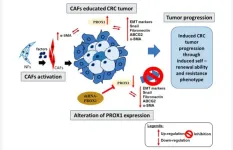(Press-News.org) If you’re pregnant, you may want to think twice before making a hamburger run or reaching for a prepackaged pastry, according to research published last month in the journal Environmental International.
Oddly enough it’s not the food that the report targets — not the fries, burgers or even the shakes and cakes — but what touches the food before you eat it.
Research shows that phthalates, a class of chemicals associated with plastics, can shed from the wrapping, packaging and even from plastic gloves worn by food handlers into food. Once consumed during pregnancy, the chemicals can get into the bloodstream, through the placenta and then into the fetal bloodstream.
The chemical can cause oxidative stress and an inflammatory cascade within the fetus, researchers noted. Previous literature has indicated that exposure to phthalates during pregnancy can increase the risk of low birth weight, preterm birth and child mental health disorders such as autism and ADHD.
This is the first study in pregnant women to show that diets higher in ultraprocessed foods are linked to greater phthalate exposures, the authors wrote.
“When moms are exposed to this chemical, it can cross the placenta and go into fetal circulation,” said senior author Dr. Sheela Sathyanarayana, a UW Medicine pediatrician and researcher at the Seattle Children’s Research Institute.
This analysis involved data in the Conditions Affecting Neurocognitive Development and Learning in Early Childhood (CANDLE) research cohort, which comprised 1,031 pregnant individuals in Memphis, Tenn., who were enrolled between 2006 and 2011. Phthalate levels were measured in urine samples collected from during the second trimester of pregnancy.
The researchers found that ultraprocessed food composed 10% to 60% of participants’ diets, or 38.6%, on average. Each 10% higher dietary proportion of ultraprocessed food was associated with 13% higher concentration of di(2-ethylhexyl) phthalate, one of the most common and harmful phthalates. The phthalate amounts were derived through urine samples taken from the women in the study.
Ultraprocessed foods, according to the researchers, are made mostly from substances extracted from foods such as oils, sugar and starch, but have been so changed from processing and the addition of chemicals and preservatives to enhance their appearance or shelf life that they are hard to recognize from their original form, researchers noted. These include packaged cake mixes, for example, or packaged french fries, hamburger buns and soft drinks.
When it comes to fast food, gloves worn by the employees and the storage, preparation, serving equipment or tools may be the main sources of exposure. Both frozen and fresh ingredients would be subject to these sources, said lead author Brennan Baker, a postdoctoral researcher in Sathyanarayana’s lab.
This is the first study, researchers say, to identify ultraprocessed foods as a link between exposure to phthalates and the socio-economics issues facing the mothers. The mothers’ vulnerability might stem from experiencing financial hardships and from living in “food deserts” where healthier, fresh foods are harder to obtain and transportation to distant markets is unrealistic.
“We don’t blame the pregnant person here,” said Baker. “We need to call out manufacturers and legislators to offer replacements, and ones that may not be even more harmful.”
More legislation is needed, the authors said, to prevent phthalate contamination in foods by regulating the composition of food wrapping or even the gloves that food handlers may use.
What should pregnant women do now? Sathyanarayana said that pregnant women should try to avoid ultraprocessed food as much as they can, and seek out fruits, vegetables and lean meats. Reading labels can come into play here, she added.
“Look for the lower number of ingredients and make sure you can understand the ingredients,” she said. This applies even to “healthy foods” such as breakfast bars. See if it’s sweetened with dates or has a litany of fats and sugars in it, she said.
This study was funded in part by the National Institutes of Health (UG3UH3OD023271).
END
Pregnant women should avoid ultraprocessed, fast foods
In a study, the consumption of fast food and ultraprocessed foods were associated with higher levels of phthalates in pregnant persons
2024-02-07
ELSE PRESS RELEASES FROM THIS DATE:
University of Houston researcher part of $5 million DOD grant to support defense manufacturing
2024-02-07
The U.S. Department of Defense (DoD) awarded a $5 million grant to the University of Texas Rio Grande Valley (UTRGV)-led America’s Additive Foundry Consortium, which includes the University of Houston as a key partner. This is one of six grants – totaling about $30 million – to help enhance national security through community investments.
The funding will enable the consortium to undertake a $7.5 million project designed to ensure that the U.S. military has a stable supply of domestically produced, high-quality tactical alloys critical for national defense. The ...
Researchers measure and control interactions between magnetic ripples using lasers
2024-02-07
One vision for the future of computing involves using ripples in magnetic fields — called magnons — as a basic mechanism. In this application, magnons would be comparable to electricity as the basis for electronics.
In conventional digital technologies, such magnonic systems are expected to be far faster than today’s technologies, from laptops and smartphones to telecommunications. In quantum computing, the advantages of magnonics could include not only quicker speeds but also more stable devices.
A recent study in the journal Nature Physics reports an early-stage discovery along the path ...
Africa could grow more rice -- new study shows how
2024-02-07
Africa’s rice sector has major opportunities to increase its yield gains through improved agronomic practices while avoiding massive land conversion, a study by international scientists including a Husker co-investigator finds. The production advances can be important in meeting Africa’s projected food needs and reducing dependence on imports, the researchers concluded.
Rice demand in Africa is projected to more than double over the next 25 years due to population growth and increased rice consumption. At present, Africa imports nearly 40% of its rice.
“Nearly 15 million hectares of rice are waiting for yield improvement in Africa, ...
PROX1/α-SMA correlated with colorectal cancer progression, poor outcomes and therapeutic resistance
2024-02-07
“The findings validate the combined PROX1/α-SMA gene set as a prospective prognostic biomarker and a central regulator in CRC progression and its TME.”
BUFFALO, NY- February 7, 2024 – A new research paper was published in Aging (listed by MEDLINE/PubMed as "Aging (Albany NY)" and "Aging-US" by Web of Science) Volume 16, Issue 2, entitled, “PROX1 interaction with α-SMA-rich cancer-associated fibroblasts facilitates colorectal cancer progression and correlates with poor clinical outcomes and therapeutic resistance.”
The tumor microenvironment (TME) plays a vital role in tumor progression through intricate ...
Ancient rocks improve understanding of tectonic activity between earthquakes
2024-02-07
UNIVERSITY PARK, Pa. — Rocks once buried deep in ancient subduction zones — where tectonic plates collide — could help scientists make better predictions of how these zones behave during the years between major earthquakes, according to a research team from Penn State and Brown University.
Clues from rock formations in Alaska and Japan allowed the scientists to develop a new model to predict the pressure solution activity in subduction zones, the researchers reported in the journal Science Advances. ...
The Medical University of South Carolina will be one of four sites exploring the genetic basis of Parkinson’s disease in the Black community
2024-02-07
The Michael J. Fox Foundation for Parkinson’s Research has chosen MUSC as one of four sites for the Black and African American Connections to Parkinson’s Disease (BLAAC PD) research study, a part of the Global Parkinson’s Genetics Program.
BLAAC PD will explore the genetic basis of Parkinson’s disease (PD) in the Black community by genotyping more than 150,000 people worldwide, setting the stage for the development of targeted treatments. According to the Parkinson’s Foundation, approximately 36,265 people with ...
ORNL's Jason DeGraw named ASHRAE Fellow
2024-02-07
The American Society of Heating, Refrigeration and Air-Conditioning Engineers, or ASHRAE, selected Jason DeGraw, a researcher with the Department of Energy’s Oak Ridge National Laboratory, as one of 23 members elevated to Fellow during its 2024 winter conference.
A thermal-fluid scientist and mechanical engineer in the Thermal Energy Storage group, DeGraw was recognized for making substantial contributions in heating, ventilation, air-conditioning and refrigeration, and the built environment. He contributes education, research, engineering design and consultation, publications, presentations and mentoring to ASHRAE. At ORNL, DeGraw works with the Building Technologies ...
Sara Federico, MD, named director of the Solid Tumor Division at St. Jude Children’s Research Hospital
2024-02-07
(Memphis, Tenn. – February 7, 2024) St. Jude Children’s Research Hospital today announced Sara M. Federico, MD, has been named director of the institution’s Solid Tumor Division within the Department of Oncology. Federico is an internationally recognized leader in pediatric oncology whose contributions have defined the landscape of treatment for high-risk childhood solid tumors, such as neuroblastoma.
“Dr. Federico’s experience will pave the way for new discoveries that will help advance cure rates for patients with high-risk cancers by identifying, testing and optimizing novel therapeutic strategies,” said Julie R. ...
Cancer researcher Craig B. Thompson named 2024 Watanabe Prize winner
2024-02-07
INDIANAPOLIS – Pioneering cancer researcher Craig B. Thompson, MD, has been named the 2024 winner of the August M. Watanabe Prize in Translational Research.
Awarded by the Indiana University School of Medicine, the Watanabe Prize is one of the nation's largest and most prestigious awards recognizing individuals focused on shepherding scientific discoveries into new therapies for patients. The prize is awarded to a senior investigator who has made a significant contribution to the field of translational science.
Thompson is the former president and chief executive officer ...
Chapman scientists code ChatGPT to design new medicine
2024-02-07
Generative artificial intelligence platforms, from ChatGPT to Midjourney, grabbed headlines in 2023. But GenAI can do more than create collaged images and help write emails — it can also design new drugs to treat disease.
Today, scientists use advanced technology to design new synthetic drug compounds with the right properties and characteristics, also known as “de novo drug design.” However, current methods can be labor-, time-, and cost-intensive.
Inspired by ChatGPT’s popularity and wondering if this approach could speed up the drug design process, scientists in the Schmid ...
LAST 30 PRESS RELEASES:
Scientists map brain's blood pressure control center
Acute coronary events registry provides insights into sex-specific differences
Bar-Ilan University and NVIDIA researchers improve AI’s ability to understand spatial instructions
New single-cell transcriptomic clock reveals intrinsic and systemic T cell aging in COVID-19 and HIV
Smaller fish and changing food webs – even where species numbers stay the same
Missed opportunity to protect pregnant women and newborns: Study shows low vaccination rates among expectant mothers in Norway against COVID-19 and influenza
Emotional memory region of aged brain is sensitive to processed foods
Neighborhood factors may lead to increased COPD-related emergency department visits, hospitalizations
Food insecurity impacts employees’ productivity
Prenatal infection increases risk of heavy drinking later in life
‘The munchies’ are real and could benefit those with no appetite
FAU researchers discover novel bacteria in Florida’s stranded pygmy sperm whales
DEGU debuts with better AI predictions and explanations
‘Giant superatoms’ unlock a new toolbox for quantum computers
Jeonbuk National University researchers explore metal oxide electrodes as a new frontier in electrochemical microplastic detection
Cannabis: What is the profile of adults at low risk of dependence?
Medical and materials innovations of two women engineers recognized by Sony and Nature
Blood test “clocks” predict when Alzheimer’s symptoms will start
Second pregnancy uniquely alters the female brain
Study shows low-field MRI is feasible for breast screening
Nanodevice produces continuous electricity from evaporation
Call me invasive: New evidence confirms the status of the giant Asian mantis in Europe
Scientists discover a key mechanism regulating how oxytocin is released in the mouse brain
Public and patient involvement in research is a balancing act of power
Scientists discover “bacterial constipation,” a new disease caused by gut-drying bacteria
DGIST identifies “magic blueprint” for converting carbon dioxide into resources through atom-level catalyst design
COVID-19 vaccination during pregnancy may help prevent preeclampsia
Menopausal hormone therapy not linked to increased risk of death
Chronic shortage of family doctors in England, reveals BMJ analysis
Booster jabs reduce the risks of COVID-19 deaths, study finds
[Press-News.org] Pregnant women should avoid ultraprocessed, fast foodsIn a study, the consumption of fast food and ultraprocessed foods were associated with higher levels of phthalates in pregnant persons








